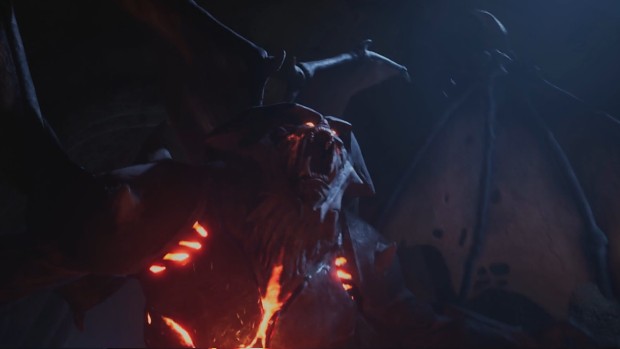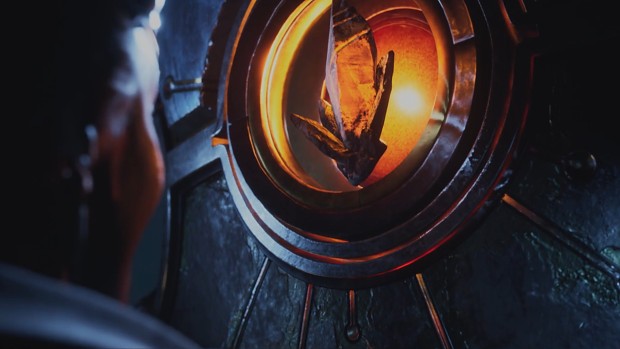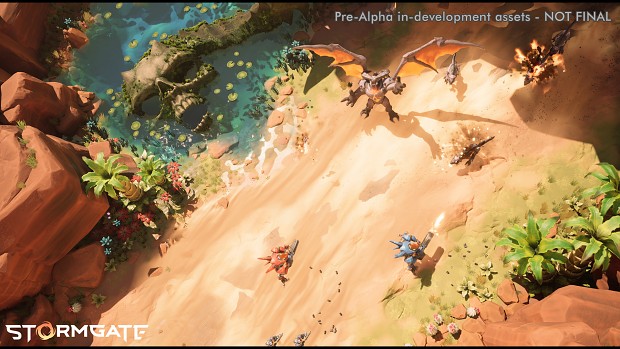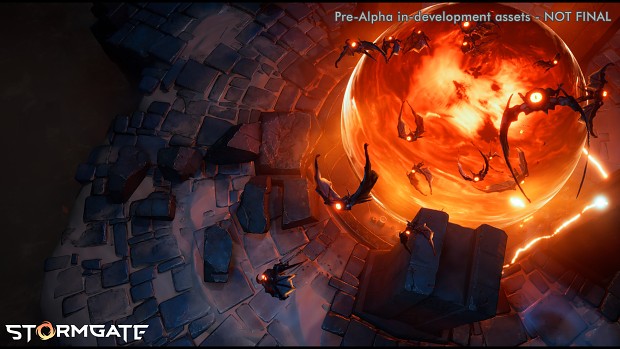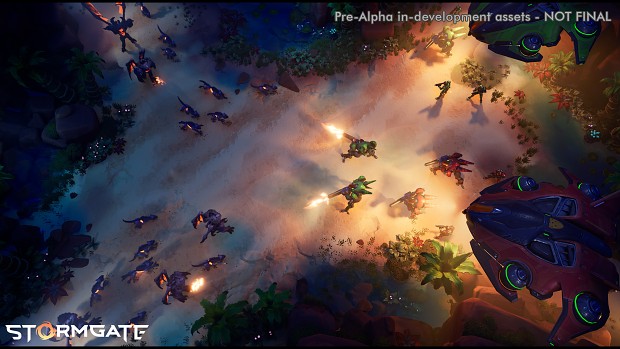We at DBolical recently had the pleasure of interviewing Ryan Schutter and Howard Xing from Frost Giant Studios. Developing the highly anticipated Stormgate, Frost Giant is looking to pave the way for a new generation of UGC-oriented AAA RTS experience. Led not only by people experienced with creating some of the best RTS titles of all time, Frost Giant’s staff-base also includes committed modders - like Ryan - who have years of experience and know what to do to channel the passion of the modding community and create a new foundation for content creators everywhere.
Read on for answers to some hot questions about Stormgate with special emphasis on its modding offering!
Introductions
Q: Please introduce yourself, your role, and your past experience
Ryan: My name is Ryan Schutter, and I am the lead UX designer on Stormgate, doing most of our UX and UI design work. My past experience is working on Starcraft 2 for six years and prior to that I was a modder. I did a lot of modding in a number of other games, particularly Starcraft 2, and prior to that I was an illustrator before making the career shift into games.
Howard: I am the financial controller at Frost Giant. I manage financial operations and long term financial planning. This also includes revenue and monetization strategies. I started getting involved in conversations around UGC initially on the monetization side, but with the help of Ryan our conversations have evolved beyond that. I used to enjoy making Half-Life 1&2, Counter Strike, SC1 & SC2 maps. While it was mostly just a fun hobby and none of my mods ever got any real exposure beyond my close friends, I have a deep respect and admiration for UGC creators.
Q: (To Ryan) You mentioned your background in modding - could you elaborate on this?
Ryan: I made a mod for Starcraft 2 called GameHeart that some people in the community might be aware of, particularly if you watch esports. Its basically a mod that changes the spectator experience for the game, and that’s how I ended up at Blizzard. They hired me to make the mod an official part of the game and then they hired me full-time after that.
Q: A few words on Stormgate’s premise and goal?
Ryan: Stormgate is our effort to make the next great PC RTS game. Our goal is to build something that could be something of a spiritual successor to Blizzard RTS, like Starcraft and Warcraft, so you’re gonna be mining resources and base building and manipulating big armies and expanding and all the stuff you’re used to seeing in Blizzard RTS games. We want to capture the whole audience as best as we can. It’s not just about competitive multiplayer, but it’s also about making sure we have a robust co-op mode like SC2’s, it’s about making sure we have awesome campaign content, and about making sure we have an awesome set of mod tools and a custom games community.
Looking Forwards (And Backwards)
Q: What major lessons do you feel there are to be learned from iconic RTS games of the past like Starcraft and Warcraft?
Ryan: Well, I think there’s huge lessons to be taken from these games, and obviously they’re our primary inspiration for Stormgate so we’re looking at them really closely. They’re not the only games that we’re looking at, but in particular a lot of our team worked on Starcraft 2 in recent years. So certain lessons we’re looking at are how did moving to F2P work for SC2, and how did custom games work out in SC2, and hey, maybe there were some problems with custom games early in SC2 compared to, say, WC3. We have a lot of experience on the team and a lot of years of seeing what was working in those games and what wasn’t and trying to tackle them over time. One of the biggest things we learned in SC2 is that co-op is super awesome, so that’s become a pillar for us in a way that it wasn’t in SC2 or WC3.
Q: You mentioned other games besides SC2 influencing the process - what other games are you looking at for inspiration on Stormgate?
Ryan: Outside of SC2, WC3, and Brood War, Relic’s games in general are a significant inspiration. I don’t think people should come into Stormgate expecting to play a Relic-style RTS game, but they are something we look at because they’ve had a lot of great design work over the years, and there are feelings created in their RTS games that if we could find ways to capturein addition to those you get by playing Blizzard RTS games, that would be awesome. Kevin Dong has this way of putting it - Stormgate is gonna be 25% StarCraft, 25% Warcraft, 25% other games, and 25% us.
Q: Are there any particular elements from these games you’re hoping to revisit and evolve in Stormgate?
Ryan: Co-op is a great example of an area where we’re able to evolve quite a bit from SC2, partially because of co-op being shoehorned into SC2, instead of planning for a certain level of success from the beginning. We’re increasing the number of players from 2 to 3 so you can play with more friends, and we’re taking a lot of lessons from SC2’s co-op that is going to let us build a more robust co-op mode this time around with a focus on replayability and social aspects.
Q: What was the decision behind going F2P? Was it inspired by any other titles (e.g. SC2 going F2P) and their success in doing so?
Ryan: The lessons we took from SC2 are a big part of that. We really feel like going F2P with SC2 was a great thing to do with the game. We saw a huge influx of players and a lot of excitement around it, and it could be even better if we were planning for it from the beginning instead of, again, cramming it in after many years of the game being live. We think it’s something that will be successful if planned from the beginning, and that’s enough of a foundation for us to go F2P. But also, if we want to broaden our audience beyond the core audience, F2P is a great way to do it. A lot of people out there have not played RTS, or have, but are skeptical of it because it’s taxing, and we want to build a game that’s much more social than prior RTS games; we want to build a game that can be more approachable for casual play, but just as awesome at the highest level, and we’re hoping with free to play, people will be encouraged to bring in their friends and participate in those social game modes.
Q: What you’ve mentioned so far indicates Stormgate is looking to plan around features SC2 just sort of put in later, and iterate on them more productively.
Ryan: All these things we did in SC2, it’s not like we didn’t expect them to be good or successful. It’s just that you try a lot of things and you’re not sure if they’ll work out, so you don’t want to invest a lot of resources in an experiment that may work out, but may not, when you have so many other areas you need to put that time and resources into. Having the experience coming from that and seeing what was working and what wasn’t gives us a lot of room to work out where to invest our time and resources.
Business Model
Q: How does Stormgate plan to monetise content in a way that is respecting the no-pay-to-win philosophy whilst also providing incentives for players?
Howard: We want this to be a purely opt-in experience - if you enjoy the game and want to play more of the content, you can choose to do so, but you’ll never be forced to buy content to remain competitive against another player. You won’t be purchasing power upgrades in a PvP setting. SC2’s F2P monetisation model is what we’ll be looking at initially. We just want players to enjoy the game, which theycan play for free, and if they want to enjoy more content via the campaign or character progression, then they can choose to do so. Skins and commanders, for example, are currently what we’re looking at.
Q: Will content drops be seasonal (a la Fortnite, CoD, etc), or expansion-based (e.g. Starcraft II, Warcraft III)?
Howard: There’s going to be seasonality to our content drops, though we’re still working out the pipeline for that. We understand a regular time players can expect to come back is very important, and has worked for a lot of games with seasonal passes like Path of Exile. We will do something similar to SC2’s war chest, but we want to do it more frequently, and align it with the competitive scene too, so when players come back, they can be engaged in both earning in-game rewards and the esports side of the game.
Q: What will be the difference between an F2P and “premium” account?
Howard: All Stormgate players are important to us, and we don’t plan to split them by free vs. paid. If a player makes a purchase, it’s because they enjoy a particular type of content and want to explore it further. They won’t bring any form of power benefit to the ladder. From a multiplayer perspective, our approach is to draw from one player pool, to support the best possible matchmaking.. We want players to have a choice to opt into paid campaign content, but we also want to be mindful about segmenting the co-op player base. We aim to create a fun social experience, and to encourage players to play together (while still giving them the freedom to play solo) and we are designing the multiplayer systems with this in mind.
Modding and UGC
Q: How is Stormgate planning to support and build upon their own modding scenes to utilise the passionate RTS modding community, particularly in Blizzard RTS?
Ryan: The number one thing we’re trying to capture and build upon is a powerful editor that is approachable and easy to use. I think that is the most important thing for getting people in and getting them moving quickly. But we also need a powerful social platform where you can see games in progress, join lobbies, and things like that. So as long as we build an ecosystem where it’s really easy to build a map or build a mod for our game, it’s easy to support multiplayer with that mod, and it’s easy to get other people in and playing it, I think that’s going to hit the major notes for laying the foundation on particular things. And then beyond that, what can we do to make our tools better? How can we make them more approachable and more powerful? And that may come with time, but those are the things we need to achieve to build upon that legacy.
Q: What do you think are the real upsides of other moddable RTS titles you’re trying to replicate?
Ryan: Definitely the ease of use of the WC3 editor - just the sheer approachability of it, feeling like you can get in there, make new units, make new abilities, lay down terrain, that feels really good. But then there’s also the power and flexibility of the SC2 editor that is so important. Beyond that, there’s also the ecosystem aspect - which is, can we build that social platform, and what games have done that really really well. SC got to a place where it was set up to have that kind of support, but because it had a rough start, it didn’t achieve what it could have. But there’s a lot of interesting platforms out there that have interesting content, and we’re looking out there to see how they’re handling things.
Howard: To add to that, we’re also looking at a few specific examples, and one thing we’re mindful of for creators is having a more approachable path to “Pro” - having more recognition among creators and players. There’s even examples out there of people having a path to monetisation and we’d like to facilitate that.
Q: There’s already quite an active creator community out there for, say, SC2 - what do you think is Stormgate’s “lightning bolt” that will make these creators want to transition to Stormgate instead of sticking with what they already know?
Ryan: I think Stormgate’s lightning bolt is building a successful game. The mod tools are important, the social platform is important, the opportunities for creators are important - but the most important thing is building a game that excites players, and creating a community of players interested in trying mod content. That’ll make modders want to create content for that community of players. Then step 2 is to make sure everything else in the mod ecosystem - like incentives, power of the editor - is there. If we can hit these things, we have a really good chance of success for the platform. It’s kind of like esports for example - you can try to build a game to be an esport, but the best way to build a successful esport is to build a successful game.
Q: What do you think are some notable failures in the past from moddable RTS titles you’re trying to avoid and improve upon?
Ryan: The most common thing we see with RTS modding is an unapproachable feeling set of tools. Blizzard has been an exception to that, and I got into modding Blizzard RTS games instead of others because the tools were so much more approachable. Within Blizzard RTS, we’ve seen specific mistakes like SC2 launching without the ability to see open lobbies– a mistake we don’t planto repeat. You need to be able to see what’s going on in the community so you can actually have a strong ecosystem for the game. By that I mean, as a mod developer, I need to know the community’s going to have some way to discover my work. Sure, you can try to have a browser with tags and everything else, but none of that’s really that great for discoverability. It helps, especially if you know the map you’re looking for, but virality is what helps these things take off and the open lobby list is important for this. Modders can open a lobby for their own game, and then others can join, learn about it, and open lobbies for it themselves in the future. That was a major missed opportunity for SC2, with the benefit of hindsight, and we need to make sure we have it on launch of the tools.
Q: (To Ryan) As Stormgate’s lead UX designer, how much of your experience in that field is crossing over into making the mod tools more accessible?
Ryan: I’ve been involved in designing the editor, helping to design a visual scripting system we’re hoping to implement (though right now we’re still scripting in C++). That has been really fun - one of our designers had the idea to improve the accessibility of the data editor to show both a simple and advanced mode. The simple mode would allow us to flag specific properties as being important, like health or damage, and filter out properties that aren’t going to matter to a first-time modder. Besides that, the other thing it allows us to do is consolidate data - in SC2 for example, the unit is split across many types of data like the marine itself, his weapon, effects, sounds, and so on. Part of this simple VS advanced system allows us to collapse that data into one object, rather than being a hundred different objects for people not interested in seeing that data separately. I’d also like to map using the editor similarly to using the game - which will be difficult, but we’re hoping if you’re at least somewhat familiar with the game, the editor will be comfortable with you as well.
Q: How powerful will Stormgate’s editing tools be? Could we potentially see a “total conversion” inside of Stormgate?
Ryan: I think you could potentially see that in the long term, though in the short term before launch, we’re not able to answer this question perfectly yet. It’s a goal for sure, but we also believe getting the tools out there as quickly as possible is the most important thing. We want to capture as much of what, say, SC2 could do as possible. We’re building this as an in-game editor, which is different from SC2. In SC2, the editor was a separate client which allowed flexibility we may not have in the same way, like for UI editing, and that’s very difficult to support using an in-game editor (though we’re investigating a scripting solution for UI which would allow creating dialogs and panels and so on). SC2’s UI solution was sort of the equivalent to the system we’re using in Stormgate, called SC2Layout, but that was incredibly advanced modding which less than 1% of SC2 modders would be playing around with, and so this kind of editing is not necessary for the vast majority of mods people create. It’s tricky in some ways because of working within Unreal Engine, but we expect to be able to build more than 95% of what people can build within SC2, and that’s just the bar we’re looking for at launch of the tools.
Q: Was there a reason you decided on an in-game editor (e.g. rapid prototyping)?
Ryan: There’s a lot of advantages to the in-game editor - it’s much more discoverable, for example, as it’s at the top bar of the UI alongside the campaign, co-op, multiplayer buttons, and so on, under a Create button. Clicking that button gets you right into the editor, and another nice thing about it is it lets you switch between playing and editing quite quickly. We can’t promise the editor will ship with that at launch, but right now I’m able to place a bunch of cliffs and switch back to try out the terrain with some units, then switch back again to add more. It’s similar to Halo’s Forge mode, minus the multiplayer aspect. Hopefully we can preserve this functionality which will allow people to iterate on maps well. It’s just something that helps make map creation more accessible because it’s discoverable and easy to iterate with.
Going back to the power of the editor, you can create maps, paint terrain, create new units, new abilities, and in some ways our data editor is more powerful than SC2’s as you can create new types of data, and is something else we’re hoping to push out to the community as our designers are able to do this in-house right now. Modding is something we’ve thought about a lot - especially as at least four people on our team are former SC2 modders before joining Blizzard - and they really know their stuff. They’ve been setting out this plan of how we would have done it from the beginning, and it’s really compelling to see what’s happening with the data editor right now. Scripting is what we’re probably behind on the most as it’s complicated within Unreal, though we’re absolutely still committed to having a solution for creators, but all the data our designers are putting in the game right now is done right within the editor. We’re hoping to put together our scripting and ability systems so that people can create new abilities very easily, though this is still very much in development.
Q: What’s Stormgate’s planned method of mod distribution - as in, how will it be discovered in-game, how will it be hosted, and will Stormgate be hoping to showcase great community content?
Ryan: Right now, regarding hosting, we’re still exploring options. There’s the WC3 model of peer-to-peer downloads, and SC2’s model of downloading maps and creating open lobbies. SC2’s is really powerful for a lot of reasons, like screenshots on pages, reviews, and descriptions on mods, and this would be a great system to capture and even build upon. The question is finding a way to build that publishing system for launch alongside the editor, and exploring alternatives for short-term solutions. We’re exploring a lot of possibilities right now for distributing mod content. We’d be likely to run spotlights and contests in the future to encourage community content, which is very valuable, though at the moment we’re focused on launching the toolset and the game.
Q: Will Stormgate employ any kind of monetisation for their modded content, as part of their F2P business model and to support content creators?
Howard: We’re having early conversations on this - too early for us to say for sure what the direction we’ll be going in is, but we’re looking at games like Roblox, Bethesda, SC2, and learning a lot from what they’ve done. A problem with some platforms is that revenue sharing is unclear with a lot of fees for creators, and that’s one of the challenges with monetising - there’s platform fees out of our control, even if we’re hoping to be as pro-creator as possible, and so there’s an issue of needing to be transparent and mindful of that. There’s also problems introduced with existing ecosystems, where taking an existing community and turning it on its head with monetisation can segment the creators and player base. That’s something we’re also mindful of, so it’s too early for us to be sure, but we are looking into it.
Ryan: While we’re looking into this, the thing we’re considering heavily is whether this makes our ecosystem feel bad - whether people can see the platform is still full of free mods they can try, and so discussing guidelines and rules on monetisation is also very important. Our biggest goal is to have a strong, diverse mod platform, but if people feel they’re coming in and everything’s behind a paywall, then that won’t happen, and we’re careful about approaching this.
Q: Is Frost Giant planning an “early access” period for modders to saturate the game with examples of UGC in time for launch?
Ryan: I think this is something we’re very likely to do. It’s not as much about saturating the game as it is about getting feedback on the tools, as although a lot of our team are SC2 modders and can guide it internally, there’s nothing compared to getting a lot of people in who have a really broad perspective on the tools. A big part of this will be getting it in their hands to get feedback, so that we know when we do launch these tools, we’re shipping tools that feel good and are what people are expecting. We do need to get people in to help us do that - and saturating is almost a bonus in that way, helping to validate our publishing system when we have one.
We’re incredibly grateful to both Ryan and Howard for their time breaking down some of the core draws of Stormgate to the wider RTS audience. RTS mods have had a profound impact on the industry and indeed, on ModDB itself, as you can see plenty of RTS representation in our latest 20th Anniversary event. Stormgate’s looking to take the next step forward in the moddable RTS scene, and we’re thrilled to see where they go next. If you’d like to see more about Frost Giant Studios and Stormgate, be sure to check out their Steam page, their website, and their Twitter. We’re also hoping to touch base with Frost Giant in the future as the game progresses, so stay tuned for another Q&A then!
